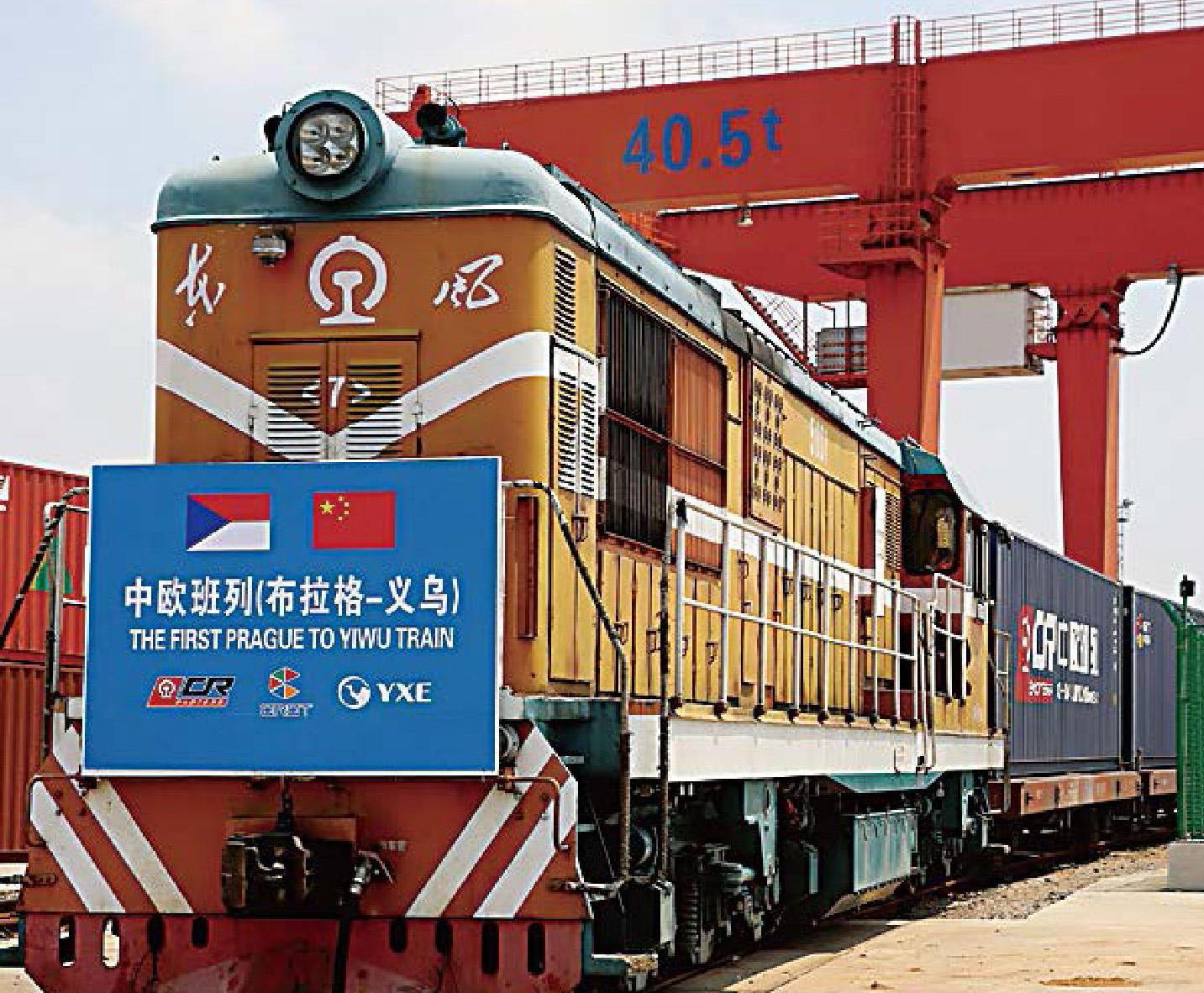义新欧:让“中国货物”向西向西再向西
2021-07-29

小城义乌,没有北上广高楼林立的气派,也没有苏锡杭自然风景的曼妙,却吸引了全球目光。今年5月,各地第七次人口普查数据陆续发布,义乌常住人口十年净增62.54万人,为185.94万,增长50.68%,一跃成为浙江人口最多的县级城市。义乌每年签证超过180天的常驻外商就有1.3万人,每年采购的外商超过50万人次。
早在秦代时,这里就已建县,取名“乌伤”,在两千多年的历史中,“乌伤”这个名字一直默默无闻。然而,在最近的三十年中,这座叫义乌的小城却摇身一变,成为全世界最大的小商品集散地。
义乌通过成千上万种商品,与世界联系在一起。而这其中,“义新欧”货运班列,承载着中国的友好与哈萨克斯坦、吉尔吉斯斯坦等七个国家进行贸易往来,不仅把中国的铁路钢材产能输送出去,还带动了国家沿线和地区的基础建设,实现更深入的商业往来,并最终实现“共同富裕”的共赢局面。
冯旭斌是“义新欧”中欧班列运营方——天盟实业投资公司的掌舵者,作为唯一由民营企业经营的中欧班列,“义新欧”干线贯穿“丝绸之路经济带”,将中国货物西行的路线拓展到西班牙马德里,并进一步延伸到波罗的海沿岸。
从“义新欧”开通至今,冯旭斌和中欧班列各方,强烈感受到的是,中欧班列的影响力越来越大,响应并参与“一带一路”倡议的国家和地区越来越广泛,冯旭斌和天盟公司的未来发展思路也是越来越清晰。一开始只是想要为义乌货物西行打通一条新路,逐渐发展到服务“一带一路”倡议,为中国和欧洲贸易建立一个平台。
2010年,义新欧贸易服务集团成立,天盟实业投资公司成为该集团全资子公司。依托中欧班列,义新欧集团编织出一条北半球的中欧贸易金丝带。目前,义新欧已经成为运营“义新欧”系列班列、场站运营、智慧仓储、铁路国际快件以及以中亚欧贸易供应链为主的国际物流和贸易的综合服务商。通过近十年的发展,义新欧在亚欧大陆的“一带一路”沿线国家和地区共设立了3个子公司和3个办事处,現有国内外员工140余人。
作为义新欧集团的全资子公司,义乌市天盟实业投资有限公司承担“义新欧”系列班列运营工作。集团依托“世界小商品之都”义乌和包括浙江在内的长三角区域的中国制造、对外贸易产生的货源为基础,为上万家中外企业提供全球物流贸易服务。比如法国很多酒庄都是家族企业,没有精力和实力进入中国,凭借运营过程中的经验,做产品代理,一条班列可以养活欧洲几百家家族企业。同时,利用中欧班列的品牌优势,和全球排名靠前的物流公司合作,未来“义新欧”品牌可以拓展空运、海运、汽车短驳物流,满足不同客户需求。
相较于其他省份举一省之力扶持中欧班列的开行,义乌的中欧班列完全由民营企业运营。目前“义新欧”中欧班列已基本实现不亏损,盈利也是指日可待。这其中的奥秘何在?
冯旭斌分析认为,首先是天盟利用原有的国际贸易和物流优势,将货物的国内集结、国外配送都揽承下来,提供全供应链服务,提高单箱效益。其次是业务创新,通过建立各地海外仓,将中欧班列打造成一个贸易通道;三是多条线路运行,使部分铁路物流优势地区率先实现市场化,用盈利线路来补贴其他亏损线路,培育市场。
冯旭斌说:“所谓市场化,最终目的是为中欧班列寻找和培养适合铁路运输这一物流方式的货主,这样才能实现可持续发展,而不是政府补贴下虚假的低运价。”市场化的结果带来真实的贸易增加,中欧班列开行以来,义乌出入境方面数据显示,发达国家到义乌市场采购的数量明显增加。
从躺着就能赚钱到殚精竭虑求发展,冯旭斌说,公司作为“义新欧”中欧班列运营方,能为“一带一路”倡议的有效落地作出贡献,“这种荣誉感和幸福感,是做其他任何事都没有办法比的”。
如今,随着“一带一路”倡议获得更广范围的认同与更多合作的机会,义新欧中欧班列作为“试金石”中的一块,正在赋予“一带一路”倡议更多意义。
Without the magnificence of Beijing and Shanghai, devoid of the sceneries of Suzhou and Hangzhou, and much smaller in size, Yiwu city is nonetheless garnering no less global attention. Statistics show that of Yiwus population only 800,000 are native, while 1.437 million are from outside of Yiwu, including more than 13,000 foreign businesspeople permanently settling in the city.
In the Qin dynasty, a county named “Wushang” was already set up in this area. While “Wushang” had been little known over the past 2,000 years, in the past three decades, “Yiwu” has become the biggest small commodity center in the world.
One contributor that helps Yiwu closely connected with the other parts of the world is the China-Europe freight trains, which run through the Silk Road Economic Belt, bringing tens of thousands of Chinese products all the way to Madrid. In the process, trade has been further promoted, the infrastructure of developing countries along the Road has been improved, and “common prosperity” is being achieved.
“The China-Europe freight trains are more and more influential along the Belt and Road,” said Feng Xubin, who is at the helm of Yiwu Timex Industrial Investment, a private company and the operator of the China-Europe freight trains. “The loss incurred at the initial stage was quite heavy, which had to be made up for by the other businesses of the company, but the costs were reduced considerably with more customers, stable supplies of goods and regular operation of the trains.”
A Yiwu native, Feng has been doing business for many years. “I have many long-term clients,” Feng beamed. “Honestly, I can now make money without having to do anything.” But resting on past achievements is never in the blood of Yiwu people. Before the China-Europe freight trains started operation, many goods exported to Central Asia and Russia had to go through Ningbo to clear customs.
“I was thinking at the time why couldnt Yiwu just open an international rail line directly?” recalled Feng. With this question in mind, Feng began applying for such a route in 2010, which was officially approved in September 2012. And in April 2013, the first direct train from Yiwu to Central Asia was up and running.
An even more exciting piece of news for Feng Xubin was the official proposal from China in September 2013, to launch the Belt and Road Initiative. Soon afterwards, the Yiwu to Central Asian trains were incorporated and became the now commonly known China-Europe freight trains. On November 18, 2014, the first train carrying 82 containers of goods departed from Yiwu, travelling across Europe and arrived at Madrid.
“Yiwu has the worlds largest small commodity market, and Madrid has Europes largest,” said Lin Huihuan, general manager of Yiwu C.F International Logistics Co. Ltd. “The trains are truly connecting China, Asia and European continent.”
What started out as an attempt to open a new westward channel for Yiwus products is gradually developing into a China-Europe trade platform for the Belt and Road Initiative.
